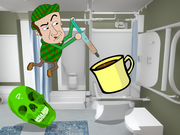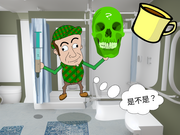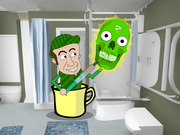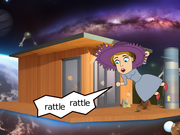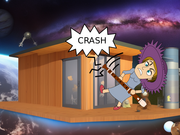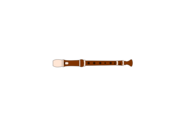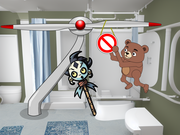to be (followed by substantives only) / correct; right; true / (respectful acknowledgement of a command) very well / (adverb for emphatic assertion)
是
=
旦
+
龰
:
Mnemonic symbol: a skull, from "to be or not to be".
Sherlock Holmes (sh) starts his day in the space station's bathroom (Ø4) with a mug of coffee (旦). Holding a skull (mnemonic symbol for 是) in his hands, he asks himself "to be, or not to be" (是). He wonders if he can make the skull come back to life using lots of coffee, and injects coffee from his mug into the skull using a syringe (龰).
Sherlock Holmes (sh) starts his day in the space station's bathroom (Ø4) with a mug of coffee (旦). Holding a skull (mnemonic symbol for 是) in his hands, he asks himself "to be, or not to be" (是). He wonders if he can make the skull come back to life using lots of coffee, and injects coffee from his mug into the skull using a syringe (龰).
是
=
日
+
下
+
人
:
Mnemonic symbol: a skull, from "to be or not to be".
Sherlock Holmes (sh) watches the Neanderthal Man (人) trying to climb to the sun (日) on a ladder (下) in the space station's bathroom (Ø4). Sherlock is afraid that he'll open the window, so he puts on a big skull (是) and scares him off.
Sherlock Holmes (sh) watches the Neanderthal Man (人) trying to climb to the sun (日) on a ladder (下) in the space station's bathroom (Ø4). Sherlock is afraid that he'll open the window, so he puts on a big skull (是) and scares him off.
(prefix indicating ordinal number, e.g. first, number two etc) / order / (old) rank in the imperial examinations / mansion / (literary) but / just
第
=
⺮
+
弓
+
丨
+
丿
:
Dorothy Gale (di) accomplished an awesome result with her composite bow (弓) in the space station's bathroom (Ø4): She shot a bamboo stick (⺮) into a banana (丿) so it was split in half, and then fired a dinosaur bone (丨) into the bamboo stick (⺮) so it was split in half as well. Dorothy is number one (第) with the bow!
(prefix indicating ordinal number, as in 第六[di4 liu4] "sixth") / (literary) grades in which successful candidates in the imperial examinations were placed / (old) residence of a high official / (literary) but; however / (literary) only; just
one / single / a (article) / as soon as / entire; whole; all; throughout / "one" radical in Chinese characters (Kangxi radical 1) / also pr. [yao1] for greater clarity when spelling out numbers digit by digit
next in sequence / second / the second (day, time etc) / secondary / vice- / sub- / infra- / inferior quality / substandard / order / sequence / hypo- (chemistry) / classifier for enumerated events: time
to come / to arrive / to come round / ever since / next
he or him / (used for either sex when the sex is unknown or unimportant) / (used before sb's name for emphasis) / (used as a meaningless mock object) / other / another
he; him (used for either sex when the sex is unknown or unimportant) / (used before sb's name for emphasis) / (used as a meaningless mock object) / (literary) other
to recognize / to know / to admit
认
=
人
+
讠
:
Robinson Crusoe is lost in the encampment's bathroom. He doesn't know anyone, and he doesn't recognize the environment! At first, he turns to an advertising column, but it doesn't tell him anything useful. But fortunately, Neanderthal Man comes in, instantly recognizes Robinson Crusoe, and tells him where he is.
to obtain / to get / to gain / to catch (a disease) / proper / suitable / proud / contented / to allow / to permit / ready / finished
structural particle: used after a verb (or adjective as main verb), linking it to following phrase indicating effect, degree, possibility etc
to have to / must / ought to / to need to
得
=
㝵
+
彳
:
Because Don Quixote kicked the genie's lamp from the rooftop of the Erechtheion as far as to inside of the Eiffel Tower, the genie demands Don Quixote to apologize. Inside of the Eiffel Tower, Don Quixote kowtows to the genie, who takes back the black sneakers he gave to Don Quixote earlier.

